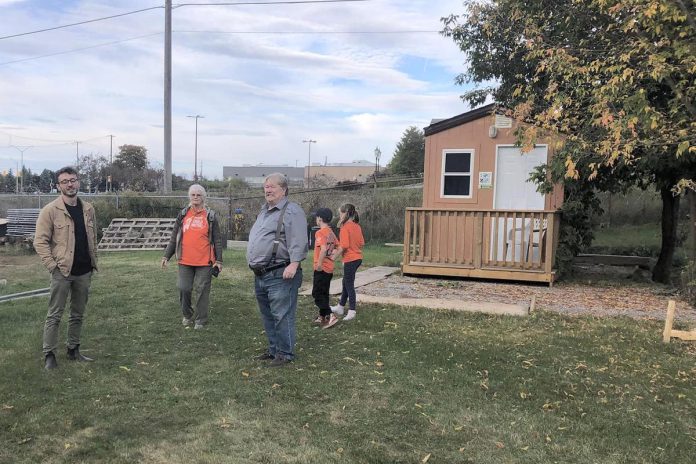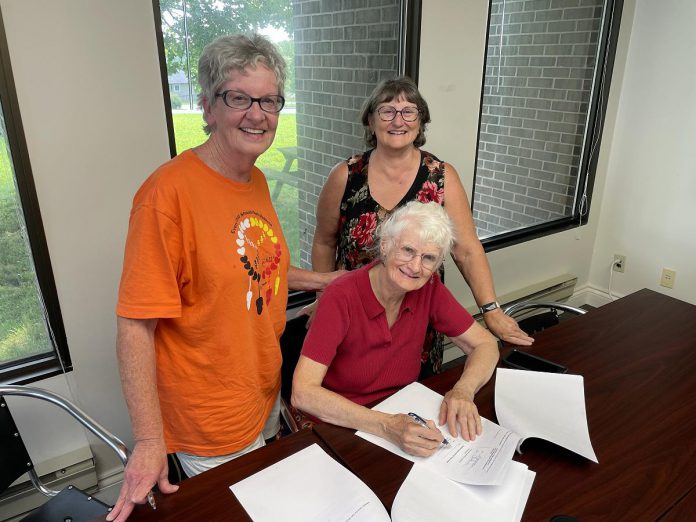
Peterborough Action for Tiny Homes (PATH) and partners are launching a new initiative where people experiencing homelessness help other unsheltered people survive the winter.
In partnership with the Elizabeth Fry Society and Habitat for Humanity Peterborough & Kawartha Region, PATH’s “Ready for Home” pilot program features a clothing hub and supply depot.
At the former location of the Peterborough Humane Society at 385 Lansdowne Street, a small number of people experiencing homelessness work alongside community volunteers one day a week to clean, repair, and package clothing items and basic supplies to help unsheltered people during the brisk months ahead.
“The idea for Ready for Home came from our amazing, collaborative steering committee,” Erin Boshart of PATH told kawarthaNOW. “We were seeing delays in being able to prepare the living cabins and wanted to create a way to build community and provide support in other ways for those with unstable housing.”
Tony D’Amato Stortz of BetterStreet — a Toronto-based group that provides consulting services for organizations supporting people experiencing homelessness — helped guide PATH towards using its current space to create this program.
“The plan really was a product of our team being able to work together to find innovative solutions to reach our greater goals,” Boshart said.

Along with preparing clothing items and basic supplies for unsheltered people, the program gives people with barriers to housing a meaningful way to build community, learn and practise skills, and contribute back where there is need.
Donated items are dropped off by appointment, processed on site, and redistributed to Peterborough charities and organizations.
The items are not available for pickup at the Lansdowne Street location, but are instead processed through the supply hub to provide additional support to existing street-level efforts.
“The best thing that could happen to Ready for Home is for the greater Peterborough community, businesses, and residents to support it,” Boshart said.
“We are open to volunteers of all kinds coming to help (with) our efforts in doing laundry and providing supplies. We would love to see local businesses show support by partnering with us and providing services. We want to build connections and it would be great if we had rotating events to highlight these connections.”
“We want to earn the trust of the local neighbours and see Ready for Home grow until we are doing things like laundry, cooking, gardening, and other activities not just once a week, but as part of the tiny home community once it is approved and constructed.”

PATH said its continuing to conduct due diligence towards site grading and zoning requirements to construct sleeping cabins on the property leased through Habitat for Humanity Peterborough & Kawartha Region.
In the meantime, according to PATH interim board chair Margaret Slavin in a media release, “we are thrilled to be using the space to create this program while we keep pressing forward with the approval process for constructing our cabin community.”
“Having a small number of participants enrolled in this weekly program allows us to build the kind of community we hope for once members are able to live on site,” Slavin said. “The goal has always been to have an array of skill-building activities within a tiny home community as participants work toward more stable housing solutions.”
Those who take part can gain trust with the local community and spend at least one day a week out of the cold and in a warm and dry facility, where basics like food and running water are accessible, Slavin noted.
The access to clean and warm clothing items “can literally save lives” as temperatures drop, she said.
For more information about how to donate or volunteer, visit PATH’s website at www.pathptbo.org.


























